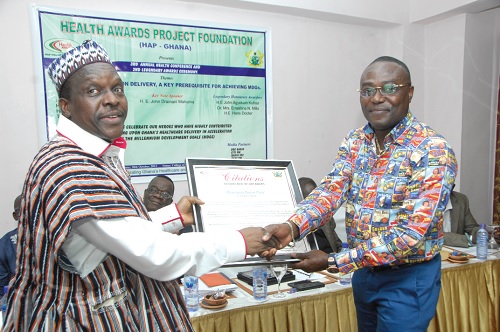‘Sanitation should be collective responsibility’
Arku Jasmine
 Sanitation issues confronting the country came under discussions at the third Annual Health Conference and Second Annual Legendary Awards Ceremony of the Health Awards Project Foundation (HAP) last Wednesday,
Sanitation issues confronting the country came under discussions at the third Annual Health Conference and Second Annual Legendary Awards Ceremony of the Health Awards Project Foundation (HAP) last Wednesday, The conference carried a theme of “Sustainable Sanitation Delivery, a Key Prerequisite for Achieving MDGs.”
Several speakers, including GIMPA School of Business Dean, Mr Samuel Bonsu, Minister of Science and Technology, Dr Joe Oteng Adjei and others, emphasised the role good sanitation plays in creating healthy and wealthy countries.
They insisted that achieving that should not be up to the government or companies alone, but should be a collective effort of everyone in Ghana.
Effects of Poor Sanitation
Although Ghana is on track to meet many Millennium Development Goals (MDGs) in 2015, less than 15 per cent of its population uses improved sanitation facilities. The MDGs set a goal of 54 per cent.
“That lack of access impacts public health, education and the environment”, Dr Adjei said.
Problems outlined by speakers included the pollution of plastic bags and the lack of access to toilets and proper waste management. The latter, they said, was often to blame for the high rate of open defecation in the country which was higher in rural areas and could lead to diseases.
The situation in Ghana, Mr Bonsu said, had become “a menace to our very existence.”
According to Dr Adjei, poor sanitation costs Ghana about GH¢420 million each year, or 1.6 per cent GDP.
Solutions
Acting Chief Director of the Ministry of Local Government, Mr Vincent Adzato Ntem, outlined projects such as the Community-Led Total Sanitation Programme and the Greater Accra Metropolitan Area Sanitation and Water Project, as the ones already working to improve Ghana’s cleanliness. Still, he said, there was more to be done.
Mr Bonsu said all Ghanaians were to blame, as companies dumped waste, government officials failed to enforce regulations and average citizens littered or defecated openly.
He suggested that Ghana should work to find natural ways to minimise environmental damage, citing how bags made from leaves were used in the past. He added that the cost of death and the effect to the economy due to poor sanitation far outweighed what the cost of proper regulation would be.
Dr Adjei said expanding recycling and funding research were important as well.
“We, as a nation, should work smarter,” Mr Bonsu said.
Address
Mr Bagbin, speaking in place of President Mahama, lauded the HAP Foundation for its role as an independent gatekeeper for the performance of the healthcare sector.
He said the President was committed to implementing the Health for All programmes, but encouraged those in attendance to regularly make choices to better the situation.
“The health of the people should be the collective responsibility of all,” he said.
Legendary Awards Ceremony
At the ceremony, award categories included Natural Health Care, Medical Health Care, Laboratory Services, Beauty and Spa, Health Insurance and Media Health Advocacy.
Winners included Champion Divine Clinic, Spinal Clinic Limited, Amen Scientific Herbal Hospital, Lapaz Community Hospital, Diagnostic Centre, FC Beauty Clinic, National Health Insurance Scheme, Nationwide Mutual Healthcare, GLICO Healthcare, Graphic Communications Group Limited and Oman FM.
By Lindsay Boyle/Daily Graphic/Ghana
